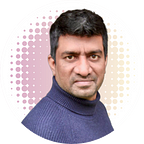Recently, I had a Linkedin exchange with a few people from the animation industry in India (my almamater) who were discussing about AI and how AI is taking away jobs. Animators, especially the ones with fine arts degrees, worry that the proper conceptual training and understanding of art is not valued anymore and that technology kills art.
I had led a ‘first of its kind’ computer #animation series 15 years ago in #India converting a fleet of 2D animators into computer animators and have grappled with this predicament before.
This is a huge topic and so, I am going to write this in multiple posts.
Is Art in the pencil (tool), or in the mind?
To start off, I’ll frame the challenge using the beautiful and enlightening conversation below between two-time Oscar wining music composer AR Rahman (ARR) and Violin expert L Subramaniam (LS).
Fun masterclass Dr. L. Subramaniam X AR Rahman — YouTube
LS has perfected his craft in violin for over 50 years and ARR uses a ‘Finger Board’ that creates the same sound with far more nuances and glides than a violin. However, he admits that one has to practice the fingerboard just like how a violinist would use a violin. He also has the humility to acknowledge his limitations and seek an expert to learn it.
Both of them have a strong foundation in music. One has perfected a tool called violin. There is a new tool that requires a fundamentally different way of creating the same sound. What should the expert do?
Midway in the conversation, LS quotes his father, “My father used to say that if you can understand the strings or fingerboard, in this case, you can play whatever you want to play. But if you have limitations on that front, then can only play what you can play. There is a big difference between what you WANT to play and what you CAN play”.
Art is both in the mind and in the execution, but the emphasis can be placed on different aspects depending on the perspective.
Concept and Creativity (Mind): This is where the initial spark of an idea ignites. The artist’s vision, emotions, and experiences all come together to form the concept behind the artwork. This is the core of artistic expression.
Execution and Skill (Tool): This is how the concept is brought to life. The artists use their skills and chosen tools (pencil, brush, camera, computer etc.) to translate the idea into a tangible piece.
The tool, whether it’s a pencil, a brush, or even a computer program, is simply a means to an end. The true power of art lies in the mind of the artist, where the concept, creativity, and emotional depth of the artwork are born.
If you want to play what you WANT to play, then learn the ‘whole’ deeply, glide between various ‘tools’ and swim across mediums.
If not, you can play only what you CAN play.
What are your thoughts?
